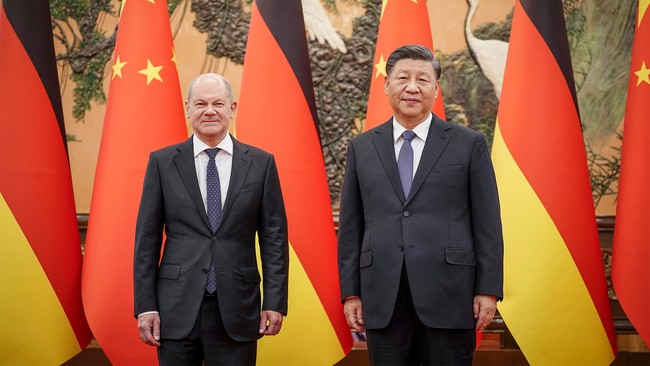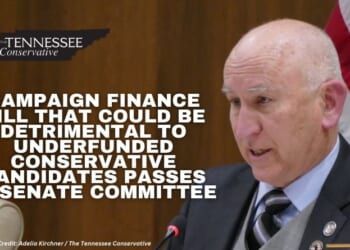
Here we go, yet another post in the long-running saga of ‘how Green energy killed the mighty German industrial complex.’
I’ve done tons of posts about them since I’ve been here and they only get more dire. Now that Germany is headed into an election on February 15th, even more scrutiny is being directed at former chancellor Olaf Schulz’s ruling coalition, which, in concert with Angela Merkel’s earlier insanity and the edicts of the European Union brahmins in Brussels, have brought the once might industrial engine of Europe…I can’t even say ‘to its knees.’
Germany is at the stage where they’re trying to keep the whole body from sinking into the economic morass they’ve created for themselves.
The country is at the point now where the biggest commercial imported threat to what industry they have left – the Chinese – have established footholds all over the country. Sectors are so weakened their last surviving German stalwarts can no longer fend off Chinese direct competitors moving in lock, stock, and barrel.
Chinese officials and automakers are eyeing German factories slated for closure and are particularly interested in Volkswagen’s sites, a person with knowledge of Chinese government thinking told Reuters.
Buying a factory would allow China to build influence in Germany’s prized auto industry, home to some of the oldest and most prestigious car brands, the person said.
Chinese companies have invested across a range of industries in Germany, Europe’s biggest economy, from telecommunications to robotics but have yet to set up traditional car manufacturing there, despite Mercedes-Benz having two large Chinese shareholders.
Any such move could mark China’s most politically sensitive investment yet. VW has long been a symbol of Germany’s industrial prowess, now threatened by a global economic slowdown hitting demand and a creaking transition to green technologies.
Building cars in Germany for sale in Europe would allow China’s EV makers to avoid paying EU tariffs on electric cars imported from China and could pose a further threat to European automakers’ competitiveness.
To hammer the point home again about the primary cause of the death of the industrial giant that was Germany?
Green energy policies and chasing arbitrary NetZero mandate madness, all of which are under the microscope as the election draws ever closer.
Not only because people are tired of it being expensive and what electricity they have being unreliable, but because the country is finally experiencing the frigidly cold winter everyone warned about…and the country is not remotely prepared to deal with it.
Germany is importing huge volumes of nuclear-generated electricity due to recent unfavorable weather for renewable energy production — placing the left-wing government’s decision to shut down Germany’s nuclear power plants firmly under the spotlight in the lead-up to next month’s federal elections.
Rather than producing its own clean nuclear energy, Berlin is importing electricity from France at a far higher cost this week as winter grips the nation with colder temperatures, overcast skies, and weak winds drastically reducing solar and wind power generation.
“Friday is a very weak day. There will also be little wind on Saturday. Monday will be almost a total loss for wind energy. Tuesday will also be difficult. The high-pressure system is extremely stable,” warned weather expert Karsen Brandt from Donnerwetter.de, as cited by Bild.
With high energy demand but insufficient green electricity, Germany’s grid operators have had to resort to importing energy at a premium — primarily from France, where nuclear power plants are running at full capacity.
That’s not how it’s supposed to work. It’s the inverse of the bargain with utility customers – they pay, the utility provides. Not the customer pays ever more for ever less.
…Energy expert Prof. Manuel Frondel of the RWI Institute described the situation bluntly. “By phasing out nuclear power and coal, we have become heavily dependent on foreign countries and accepted higher supply risks.”
This strategic miscalculation is not new. Similar shortages in December saw Germany’s electricity prices surge to record highs, with some businesses forced to halt production due to unaffordable costs. This led to electricity prices on the exchange soaring more than tenfold, reaching as high as €1,156 per megawatt-hour.
Carsten Brzeski, chief economist at ING Diba, warned that prices could continue to rise, despite nuclear imports from France. “I assume that prices will keep increasing. This does not immediately impact all consumers, as many have fixed-price contracts. However, those on dynamic pricing models will feel the effects.”
Alternative for Germany’s party head Alice Weidel is making sure everyone knows where she stands on the renewables question and has sworn to revitalize Germany’s nuclear sector.
…Branding wind turbines “windmills of shame” during a recent X Spaces conversation with U.S. billionaire Elon Musk, Weidel vowed to return to nuclear energy and build more coal power stations.
“They switched off the last nuclear power plant to even more create a shortage of energy, so either you must be very stupid or you just hate your own country,” Weidel said of the current administration.
Below is a fascinating explanation of the tenuous state of natural and liquid gas stores in Germany and what those energy policies have done to the industrial base of the country in truly just a few years.
You have to watch at least the first 3 of the 5 minutes or so. It’s appalling for a country to be so derelict in its energy security responsibilities.
🔥GAS PRICES🔥
Why are they on the rise again?
Why is Europe (and the UK) deindustrialising at a rapid pace?
Why have we failed (contrary to the conventional wisdom) to increase the amount of non-Russian gas in our system?
Lots of questions. Some answers in my five min primer 👇 pic.twitter.com/Xfbzak1rAW— Ed Conway (@EdConwaySky) January 7, 2025
The backlash against the Green grifters has already started in other countries. In Austria, when the Freedom Party recently took charge, they announced the end of Green government subsidies to start balancing a budget hole that was hidden by the previous administration.
The Austrian Freedom Party and the People’s Party pledged cuts in “climate subsidies” to curtail Austria’s ballooning budget deficit.
The two parties – currently in government coalition talks – made the announcement in Vienna January 16.
The previous coalition government, led by the Austrian People’s Party and the centre-left Green party, introduced “green” subsidies including a VAT exemption for solar power, and a “climate bonus” to offset the costs of a new carbon tax on fossil fuels.
…After the September 2024 election, it emerged the previous government had covered up the true extent of the budgetary shortfall–which in 2025 is expected to come to €20 billion, over 4 per cent of Austria’s GDP.
But the right-wing extremists are the problem?
Anyway, Geert Wilders in the Netherlands, where the economy is on far firmer ground, is going after the grifters, as well.
Dutch hard-right leader Geert Wilders called on his country’s government to cut spending on climate policies and the Ukraine war to fund tax cuts.
“The Dutch are having a hard time making ends meet, inflation is rising,” the Party for Freedom (PVV) leader told journalists January 14.
Wilders blasted the desire to spend cash on “left-liberal hobbies” while Dutch people are struggling.
While “other parties do want to reserve more money for Ukraine and the climate”, he said, “I am not going to let it happen that with a historically low national debt and a deficit neatly within the margins we will soon leave the Dutch out in the cold.”
…“I want us to finally put the Dutch first. Many are struggling, life is getting more and more expensive,” he wrote on X January 15.
Wilders urged politicians to adjust the country’s spending to benefit Dutch taxpayers.
“Helping people is our priority over extra billions for left-liberal hobbies like climate,” Wilders said.
Good Morning from Germany, where labor productivity has stagnated—or even declined—since 2020. Meanwhile, US companies have embraced AI’s benefits and recently achieved significant productivity gains. Notably, productivity trends in Germany and the US have been diverging since… pic.twitter.com/AiFaBYSSrx
— Holger Zschaepitz (@Schuldensuehner) January 16, 2025
AI won’t save them. It takes a lot of electricity to run those data centers, and they haven’t enough as it is.
The largest party and part of Scholz’s former coalition, CDU, is talking about ‘investigating’ the renewal of nuclear energy as a solution for Germany’s current ills.
…Nearly two years after Germany shut down its last nuclear reactors, the country’s conservative CDU/CSU opposition has called for more research into nuclear technology. The parties also want to examine the possibility of bringing decommissioned nuclear power plants back online.
With an eye to the German federal election in February, the CDU/CSU election manifesto says nuclear energy “has an important role to play, particularly with regard to climate targets and security of supply.”
Friedrich Merz, the CDU’s candidate for chancellor, has described Germany’s withdrawal from nuclear as a “strategic mistake” but says it’s unrealistic to think that the last of the nation’s reactors to be shut down could be brought back online.
The far-right Alternative for Germany party is also pushing for a return to nuclear energy as part of a “sustainable, serious energy mix,” with chancellor candidate Alice Weidel claiming in a recent interview with German broadcaster ZDF that it has “a CO2 footprint of zero.”
The governing coalition of the center-left Social Democrats and Greens, meanwhile, have both ruled out a return to nuclear, which is also connected to indirect emissions from the long and complex construction process of reactors.
While Scholz’s caretaker coalition is content to keep a stick planted in their individual eyes, I certainly hope German voters don’t let Freidrich Merz and his party forget that they, along with Scholz and Halbeck’s Green party, were the ones who brought the country to the current sorry state it’s in.
How very kind of Merz and CDU to now be considering nuclear as a viable alternative to freezing to death and watching your country implode. Where were they back in April of ’23 when they turned the last reactor off?
Smugly patting themselves on the back.
Oh, now?
It’s all about the election survival and not about the flaming ruins at all.









